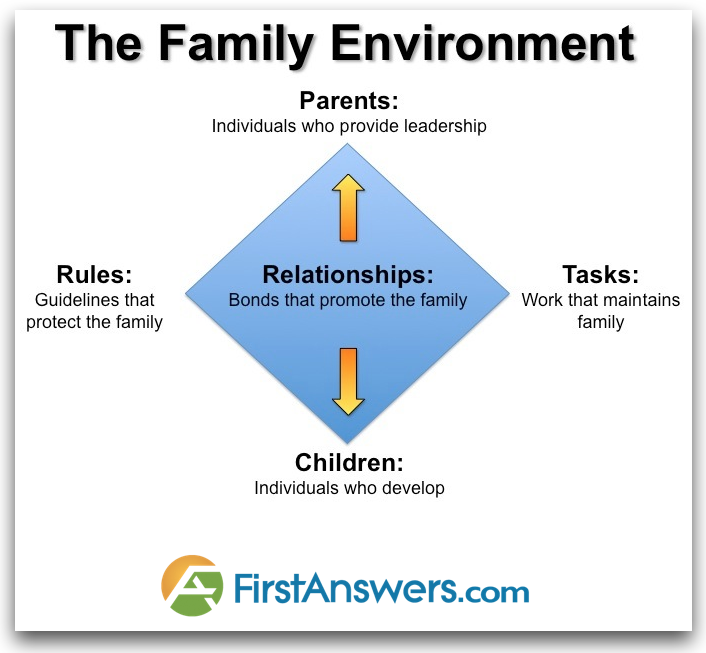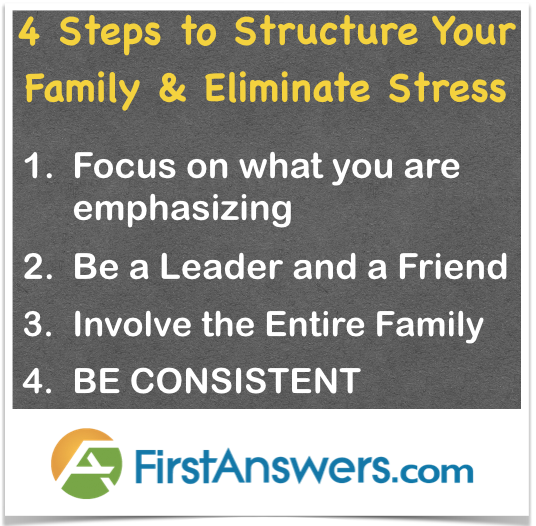Solve Blended Family Problems: Structure the family to Eliminate Stress
Find Balance by Creating Family Structure
Stress is a common blended family problem. A powerful tool to manage stress when blending families is to better understand the family environment. When you understand the elements of a family environment, you can proactively create a family structure that is predictable and comforting. Did you know a big component of self confidence for children is a predictable environment? A predictable environment, like your family, helps children build confidence, because they better understand what is expected of them and what to do to be successful–obey rules, be helpful and kind, do chores, follow schedules, etc. This structure is also the first, and best tool for preparing children for other social environments: school, work, with friends, etc. It is a powerful tool to establishing BALANCE in your family. And balance eliminates stress.
Take a look at the elements of a family structure to get a better understanding of how you can use your family structure to solve common blended family problems.

Understand the Family Environment
The 5 elements interwoven into the family environment:
- Parents
- Children
- Relationships
- Tasks–work that needs to be done
- Rules–conditions like curfew, doing homework before TV, etc. Other examples of rules in social setting may be–social etiquette, moral laws, rules for a situation, policies and procedures at work.
Notice the graphic to the right illustrates how relationships link parents and children together with rules and work. These relationships are the power. Rules are created and carried out more effectively, and tasks (chores, homework) are more easily maintained when strong, healthy relationships exist.
Pay attention to the style of parenting you use, and the results. Perhaps you think rules are most important. Consider how that parenting style affects stress levels and the development of children, for example.
WORK
If balance is missing from these five elements, one parent may value work over relationships and 1) Focus more on their work more than they do relationships with children, 2) Focus more on if their children are performing than the development of their relationships with children. Remember, balance is the key. You can do both–expect work/performance, and develop relationships.
If you focus on positives and developing strong relationships, involving communication, you will avoid feeling like you have to react to negatives and looking for ways you can exert more control over children.
RULES
Valuing rules without relationships, is similar to tyranny. Inevitably, any form of child management based exclusively on parental authority or rewards (RULES) leads children to sense that the power and control in their lives are not internal–that they do not have control over themselves. Their selective attention often becomes focused on what is outside rather than within them. What follows is quite understandable. Children develop strategies to get what is wanted or needed from these external sources of rewards instead of paying attention to the development of inner qualities. Even if they comply at home and look like they are doing alright, they may become dependent on someone else telling them what to do, rather than feel more responsible for themselves. They may be more interested in clothes, popularity, and social status than in being morally mature. They may be more vulnerable to the influence of friends who offer drugs, sex, etc.
RELATIONSHIPS
There are many positive examples of people who find rewards in their relationships with other people and place a high priority on them. But you might attach so much importance to your relationships that they control your life. For instance, there are people who think pleasing others is the most important priority. Such individuals might be very nice, easy to get along with, and likable. However, they may be late for appointments because they were talking with someone. They may have difficulty finishing their work, appear to be unable to organize what they do, and live in a world of excuses. They might employ deception in order to avoid assuming responsibility for what they need to accomplish or for rules and requirements they fail to obey.
Structuring Your Family to Eliminate Stress
The key to eliminate stress in a blended family is to create balance in the work, rules and relationships of your family.
- Focus on what you are emphasizing
Pay attention to how much emphasis you put on your own job, "work," compared to how well you establish relationships with children and step-children. Understand that rules are important, but too much focus on them can actually inhibit your children's growth–and it can take up more of your time and cause stress–because you will constantly have to enforce rules. - Be a Leader and a Friend
Being friends with children and step-children is great; and you should be. But you need to be their parent first, and children need to be taught how to learn and improve. You can be both a parent and a friend. - Involve the Entire Family
Involve children in making rules so they learn responsibility–to their own suggestions–and feel part of something. Children are much more likely to follow rules they help to establish. When rules are broken, take a moment, and remember to also focus on relationships. Who knows, maybe while talking with your child about why he was late you will will learn that he stopped to help someone–and this is a good thing. You want your children to be thoughtful and kind. Maybe it is a good teaching moment to then ask that they call to communicate with you that they will be a little late, for example. This also shows that you care about them and not only about the rules. - BE CONSISTENT
Consistency > Predictability > Confidence. Have regular family meetings or conversations about how things are going. Discuss areas that need improvement. Point out areas where children are doing well. Talk about how work in the home is necessary and how every family member needs to participate–so everyone does a little, instead of a few doing a lot. These regular meetings are essential, because it keeps family members informed on what to do, how to help, and they are needed to resolving conflict sooner–or even preventing conflict. If you feel awkward about having "family meetings," this is understandable. But having consistent family meetings is much easier than dealing with frequent stress, and blending families presents enough stress. Just start. Soon your new blended family structure–including regular meetings–will be functioning smoothly, because your family will know what to do to help in eliminating stress.
 RSS Feed
RSS Feed